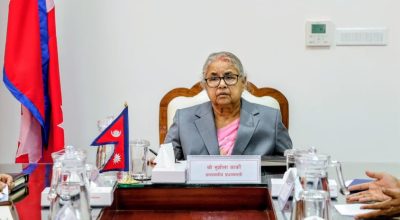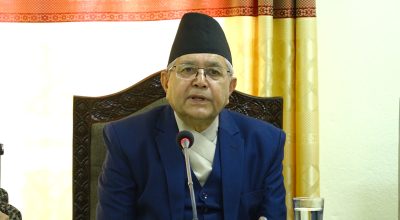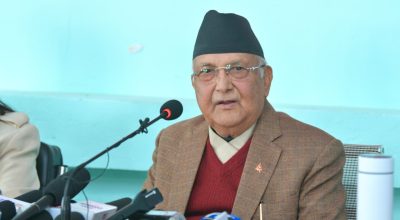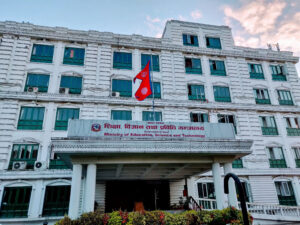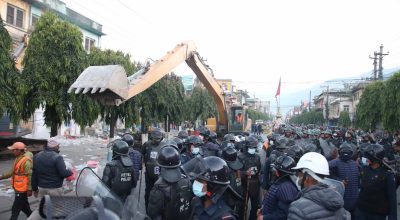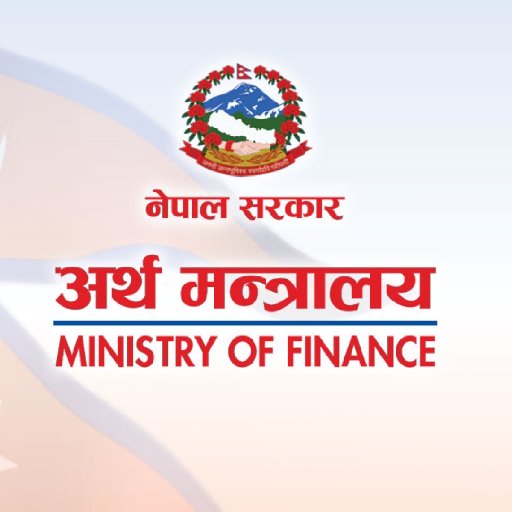
Ramesh Lamsal/RSS
KATHMANDU: As a member of the United Nations, Nepal is bound to achieving the Sustainable Development Goals (SDGs), a set of 17 goals determined by the world body which have to be met by 2030.
Nepal requires an annual budget equivalent to Rs 2 trillion 25 billion to advance towards the SDGs.
This year, the government unveils the budget of Rs 1632.083 billion which is less by Rs 400 billion than the size of budget for the SDGs.
The incumbent government brought the Bill to replace the ordinance budget presented by the erstwhile government slightly cutting the size of the budget.
The budget for the current fiscal has been already endorsed by the House of Representatives (HoR).
Of the total budget, the Federal Government has Rs 607.79 billion (41.52 percent) towards the current expenditure, Rs 378 billion (23.13 percent) towards capital expenditure and Rs 189.44 billion (11.60 percent) towards fiscal management.
Likewise, Rs 387.03 billion (23.72 percent) of the budget has been allocated towards fiscal transfer in the province and local levels.
Of the budget released towards fiscal transfer, Rs 325.075 billion (84.11 percent) including matching grants is towards current expenditure and Rs 61.55 billion (15.89 percent) is towards the capital expenditure.
According to National Planning Commission (NPC)’s secretary Kewal Prasad Bhandari, an average annual budget, Rs 1,111 billion is to be managed by the government sector, Rs 739 billion by the private sector and Rs 87 billion by the cooperative and non government sectors. Similarly, domestic sector is expected to contribute Rs 88 billion.
The NPC has already assessed the financial resources and the potential areas of resources to implement the SDGs by identifying the need of sustainable development goals in Nepal, cost estimations and financial strategies required to advance towards the SDGs.
In average, Rs 585 billion is seen to be insufficient annually in the investment to be invested from government and private sector. In order to manage low financial resources, it is necessary to improve tax administration by implementing a progressive tax system internally and widening the tax base.
Secretary Bhandari said that it is necessary to encourage private and other sectors for investment, to make public private partnership system effective and to mobilize foreign development aid and foreign investment.
Similarly, there is a need to increase financial scope by preparing the basis of mobilization of additional resources from federation, provinces and local levels in the phase of implementation of fiscal federalism. Policy-level, legal and institutional structures have been prepared to make implementation of sustainable development goals effective and systematic. Its systematic mobilization is essential.
A draft of a new Statistics Act has been prepared to develop a reliable and strong statistics system as well as a national strategy related to statistics has been prepared and brought into implementation. National Census 2021 has also begun. The government would get statistics required for it from the national census.
A high-level Central Directive Committee under chairmanship of the Prime Minister, the Sustainable Development Goals Implementation and Coordination Committee under coordination of the vice-chairperson of National Planning Commission and a Thematic Working Committee under coordination of a member of National Planning Commission have been formed for the implementation and monitoring of SDGs.







